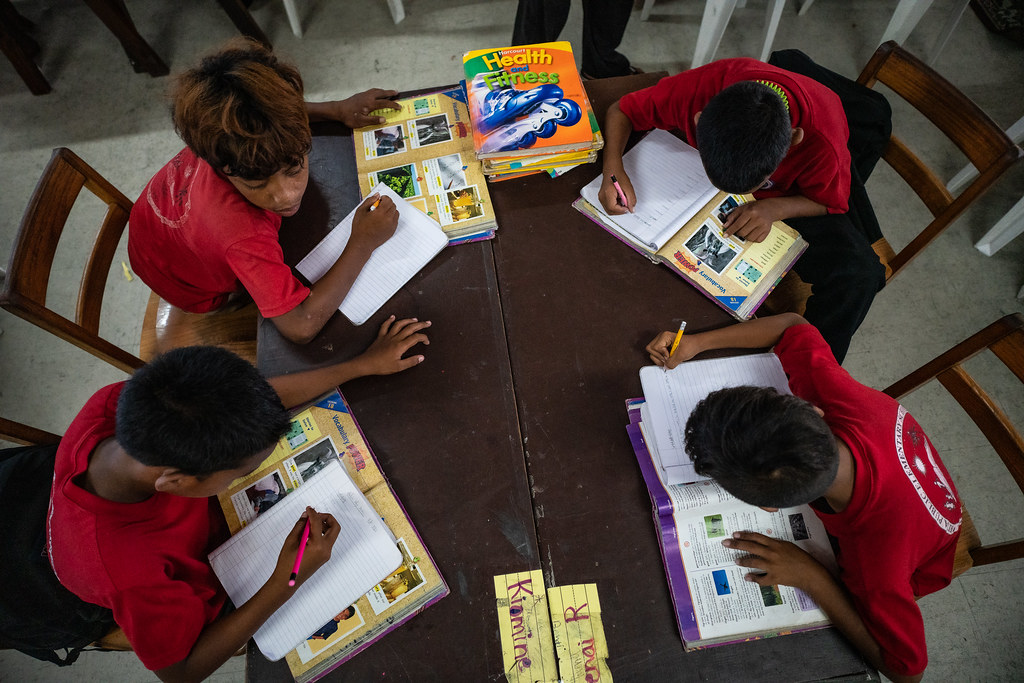RMI Education and Skills Strengthening Project
The Government of the Republic of Marshall Islands has received financing from the World Bank for the Education and Skills Strengthening Project (ESSP) cost. It plans to use part of the profits for seeking advice from services.

The consulting services ("the Services") will help the Project Manager and the RMI National Training Council in executing the World Bank-funded project efficiently.

The task will focus on supporting the Project Implementation Unit (PIU) in creating a structure for Recognition of Prior Learning (RPL) for TVET, targeted at assisting the College of the Marshall Islands and the RMI National Training Council examine and improve the abilities of employees through accredited college certification.
The detailed Terms of Reference (TOR) for the task are shown in the connected Terms of Reference (ToR).
The National Training Council now welcomes eligible people ("Consultants") to show their interest in supplying the Services. Intrigued Consultants ought to supply info showing that they have the needed credentials and appropriate experience to perform the Services (connect a Cover Letter of no more than 4 (4) pages dealing with the obligatory experience and certification requirements curriculum vitae with a description of experience in comparable assignments, comparable conditions, etc). Firms' personnel might express interest through the utilizing firm for the task. In such a scenario, just the experience and qualifications of people shall be thought about in the selection process. The criteria for choosing the Consultant are: A.
Mandatory Qualifications and Experience Master's degree in education, training
, management, or a related field. Minimum of 5-10 years of experience working in TVET System. Curriculum Design and Systems.
Possess 2-5 years' experience creating and
implementing RPL. structures, policies, and treatments. A sample of previous work will be required as evidence of previous experience. Excellent communication, training, and facilitation
skills. Experience with dealing with diverse stakeholders, including government. companies, TVET organizations, companies, and learners in the Pacific. B. Desired Qualifications and Experience Ability to deal sensitively in a multicultural
environment and construct reliable group relationships with customers and relevant stakeholders. The attention of interested Consultants (consisting of companies )is drawn to paragraphs 3.14, 3.16 and 3.17 of the World Bank's"
Procurement Regulations for IPF Borrowers "July 2016 revised November 2020" Procurement Regulations ", setting forth the World Bank's policy on dispute of interest. Further information can be gotten at the address below throughout workplace hours, 0900 to 1700 local time. Expressions of interest must be
delivered in a written type to the address listed below (personally or by e-mail )by 5:00 pm, 23rd December 2024.
The subject line must state:"National Training Council Strategic Plan Consultant -full name of the prospect". Julius Lucky Director National Training Council!.?.!ntcdr@ntcinfo.org:Phone: 692 625-4521 Empowering Community Champions for Sustainable Development in RMI Gender Equality, Climate Resilience and Water Safety Training Majuro,
Republic of the Marshall Islands: The 4th
Women and Youth Training for
Gender Equality, Climate Change, Disaster Risk Reduction and Water Safety Management has actually recently taken place at the University of the South Pacific's campus in Majuro, the Republic of the Marshall Islands(rmi national training council ). This essential training was arranged by the United Nations Development Programme( UNDP )Pacific Office through the Addressing Climate Vulnerability in the Water Sector(ACWA) project. The week-long capacity-building training intended to empower ladies and youth with the knowledge and practices needed for climate-resilient water security management in the
Republic of the Marshall Islands(rmi national training council ). This training reinforces a dedication to improving rmi national training council's water security and neighborhood resilience versus climate modification impacts, specifically females
and youth, making sure that nobody is left. The training invited individuals from all 24 atolls and featured resource speakers from government companies, non-governmental organizations, and global development partners from the RMI Environmental Protection Authority, Climate Change Directorate, Office of the Chief Secretary, Ministry of Culture and Internal Affairs, National Disaster Management Office, Women United Together Marshall Islands, rmi national training council Human Trafficking Task Force, Waan Aelõñ in Majel, Jo-Jikum, and the International Organization for Migration. In her opening remarks, Secretary for the Ministry of Culture and Internal Affairs, Brenda Alik, underscored the significance of cumulative action in constructing a climate-resilient country."It is our duty to come together and interact. As we face the obstacles posed by climate change, understanding its influence on our water resources is important for enhancing the wellness of neighborhoods throughout the Marshall Islands,"she stated.
RMI Environmental Protection Authority General Manager Moriana Philip highlighted in her speech the necessary function of women and youth in addressing climate-related obstacles."This workshop joins us from numerous neighborhoods to attend to the pressing problems we face today, including climate-related difficulties, especially on our water resources."We wish to highlight the essential role of females and youth in this task as your participation is instrumental to its success and beyond, "she stated.
The first day of the workshop covered vital concerns associated with gender equality, human rights, and public health within the Marshall Islands. It consisted of discussions on gender equality and mainstreaming, concentrating on the impacts of climate modification on water security and the disproportionate results on vulnerable groups. The value of incorporating gender equality and social inclusion into all job elements was likewise discussed. Human rights and human trafficking were dealt with, stressing the requirement for thorough defense of vulnerable populations
during emergency situations. In addition, the workshop addressed gender-based violence, highlighting the different forms that can occur in catastrophe scenarios, such as domestic violence and sexual browbeating. The program concluded with a concentrate on sanitation and health and their crucial function in health, incomes, school attendance, self-respect, and building durable communities. ACWA Project Manager Koji Kumamaru expressed his thankfulness to all participants
, highlighting the value of their contributions to their communities."Women and youth are crucial to the success of the ACWA task. More significantly, you are the champs and future leaders who will go back to your neighborhoods to empower others,"he said. Throughout the workshop, individuals went to Rongrong Island and examined the 15,000-gallon Flatpack Modular water tank set up at the Rongrong High School Boys Dormitory as part of the ACWA project. The installation is an essential component of the job, matched by support from Australia
's Department of Foreign Affairs and Trade. The go to worked as a valuable firsthand experience of the favorable impact of the ACWA task on the neighborhood and its
water resources. Marie Naisher from Jabat Island revealed her appreciation for the chance to sign up with the workshop and made clear her desire to be part of the job when it reaches Jabat.
"This was my first time taking part in such training, and I learned so much from the guest speakers, group activities, and the site visit. I now comprehend the importance of clean water and how to sterilize it. I'm fired up about the ACWA project concerning Jabat and prepared to assist when it shows up,"she stated. Don Kobney, an ACWA website planner from Santo, Kwajalein, likewise shared his enjoyment."The workshop and website visit boosted my confidence and understanding of the water tank setup.
Seeing the 15,000-gallon flatpack modular water tank firsthand gave me a clear understanding of the system, and I'm anticipating sharing this knowledge with my neighborhood, "he stated. By the workshop's end, individuals were much better equipped to understand environment modification and its regional impacts, drive adaptation and mitigation efforts, particularly in water security, and utilize brand-new resources to affect their neighborhoods positively. ACWA is made possible thanks to the support of the Green Climate
Fund, with the project co-financed by the Government of the Republic of the Marshall Islands
. The Marshall Islands: Skills Training and Vocational Education Project Assesses the performance of the job and highlights lessons. Provides inputs to 2 wider examinations- the local assessment of ADB support for the Pacific and the special examination research study on Millennium Development Goals. The low academic attainment and lack of Marshallese skilled workers were mostly due to the poor quality of standard education, absence of access to education in the outer islands, and weak points in abilities training and the vocational and technical education system.
These supported an economy marked by high joblessness because of constrained private sector growth and government downsizing. Joblessness was specifically high amongst the youth and women in the outer islands. Appropriate regional proficient workers for existing task vacancies
were unavailable, thus the importation of properly proficient foreign employees. Therefore, there was a mismatch between offered tasks and abilities of the Marshallese labour force. These conditions supplied the initiative for the Government
of the Marshall Islands to prioritize technical and vocational education training reforms. In 2000, ADB approved a loan for $9.1 million to improve skills training to offer trained workers needed for continual financial and social development. This was to be attained through an integrated national skills training system. The job included four components: advancement of a profession awareness program, skills training enhancement, boosted abilities training chances for ladies and youth, and institutional conditioning. The expected outcome was increased income-generating chances and work for trainees, particularly women and youth in the outer islands. Overall, the job was ranked not successful. Restricted progress was achieved in making the task responsive to the requirements of its recipients and private-sector companies. The long-standing weakness of bad numeracy and literacy proficiencies
among public primary and secondary school graduates and dropouts getting in college or attending voc-tech education could be partly attributed to the poor quality of standard education. The task was supply-driven and might not establish a strong linkage with economic sector requirements or align its activities with the needs of the labour market. The status of the technical and vocational education training system has stayed essentially the very same after task completion. The research study put forward that ADB might motivate the Government of the Marshall Islands, through consultation and policy dialogue, to follow through on the federal government's
commitment to establishing a devoted labour information system to connect technical and occupation education training program offerings with market need. Although the project established a labour market details system, in the lack of in-house personnel capability at the National Training Council, it was not totally operational.











